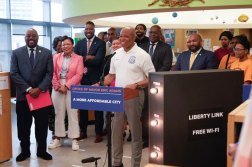New toolkit shows little cities how to buy like big ones

Many small and midsize cities across the United States are home to aging and failing infrastructure, yet due to limited funding these municipalities are often forced to make gradual repairs rather than invest in more productive long-term solutions. But this week, technology firm The Atlas published an interactive toolkit to help cities navigate this problem.
Following the launch of a program in January designed to encourage procurement as an entry point for innovation, The Atlas piloted its interactive toolkit — widely released on Monday — that allows small cities to access new ideas, partners and resources to solve their infrastructure needs. The toolkit shows cities how it can use three innovative “big city” procurement tactics to encourage early-stage, critical decision making on infrastructure issues.
“Procurement can actually be an entry point to innovation rather than a barrier to it,” The Atlas co-founder Ellory Monks told StateScoop. “The goal of the toolkit was to give small- and medium-sized cities an opportunity to experiment the way it is being done in big cities right now.”
The toolkit helps officials determine ways their cities and utilities can continue working within their current procurement systems while facilitating better decision making, execution and results.
There toolkit has four steps that guides the user through crafting a “problem statement” to setting response terms for vendors.
In the toolkit, the first step is structured as a series of Mad Libs with fill-in-the-blank exercises to help officials refine and understand the city’s issue.
“Crafting an airtight problem statement is actually really difficult and a lot of cities in traditional procurement processes can get caught up in the problem and assume that being more specific is better,” Monks said.
According to Monks, not having a thoughtful problem statement can limit the innovation process and discourage cities from seeking solutions that could prove beneficial later on.
“The Mad Libs are geared towards helping those cities craft a problem statement that will draw forward creative solutions that will solve the problem at hand, rather than being so prescriptive that it tells respondents exactly what they looking to build or buy,” Monks said.
The second step directs the user to three “big city procurement tools” that are relevant to their issue, including requests for ideas (RFIs), design competitions and performance contracts.
Many big cities and counties — such as Boston, Atlanta, Philadelphia and Prince George’s County in Maryland — have recently had success experimenting with such procurement tools, Monks said, while smaller cities had not previously been provided the same opportunities.
The third step is for officials to assign a degree of difficulty to their challenge.
“It’s important to determine your local government’s capacity for addressing the problem you’ve described so that any eventual procurement process matches your city and/or utility’s time and resources to follow-through,” the toolkit says.
The last step of the toolkit is where most procurement processes start: the user is asked to set response terms that will encourage participation from vendors.
Monks said indispensable research and engagement with cities for this project was done by Re:Focus Partners, a design firm based in San Diego, California, while it also received financial support from the Kresge Foundation, a Troy, Michigan-based philanthropy.
Now publicly available, the toolkit was piloted in May by eight businesses and seven cities, including Anchorage, Alaska; Camden, New Jersey; El Paso, Texas; Gary, Indiana; Imperial Beach, California; Norfolk, Virginia; and Providence, Rhode Island.
The pilot cities initially focused on water related issues, she said, including lead in drinking water, stormwater management and rising sea levels, but ultimately the toolkit was designed to help cities understand their capacity to respond to a wide range of issues.






